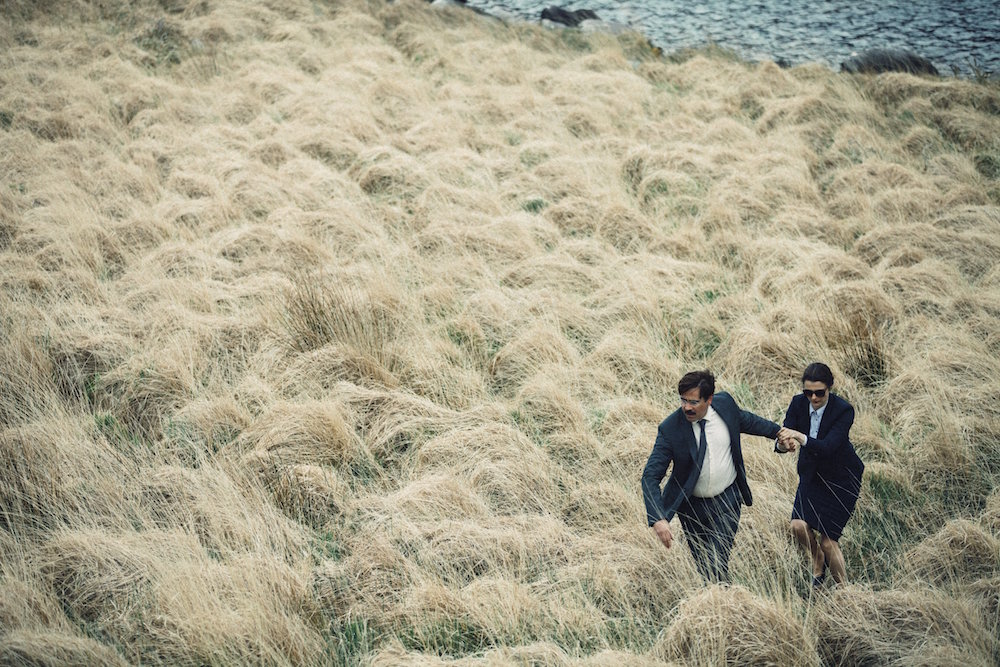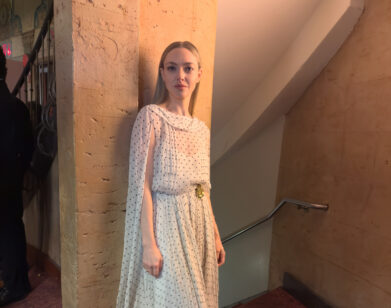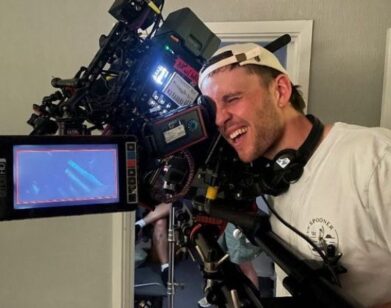Animal Instinct

COLIN FARRELL AND RACHEL WEISZ IN THE LOBSTER. PHOTO BY DESPINA SPYROU, COURTESY OF A24.
Greek director Yorgos Lanthimos’s stock-in-trade is surreal, wickedly shrewd reads on societal norms. Take his 2009 film, Dogtooth, a hilariously bleak read on nuclear family values, where a controlling patriarch confines his adult children to the family’s compound, stripped of outside influence, and Alps (2012), in which actors set up a bereavement organization where they impersonate the recently deceased for their friends and family.
To call his fourth feature, the Cannes Jury Prize-winning The Lobster, a romantic comedy is euphemistic; the absurdist dystopian premise is a fatalist version of The Bachelor on downers, starring Colin Farrell as a fleshy middle-aged divorcé who must recouple within 45 days, otherwise he’ll wait out the rest of his life in corporeal purgatory as an animal. (His pick? The titular crustacean of the title.) Lanthimos and co-writer Efthimis Filippou’s moving set pieces of farce, isolation, and the mirage of emotional fulfillment, embodied by a cast of indelible personalities played by Rachel Weisz, John C. Reilly, and Léa Seydoux, give this tautly paced dramedy an existential bite, but more importantly, a heart.
Interview spoke with the London-based Lanthimos last October at the New York Film Festival.
COLLEEN KELSEY: I would definitely not call this film a romantic comedy, but it ends up being a very romantic film that’s initially very skeptical of romance. Was that a construct you wanted to play with?
YORGOS LANTHIMOS: It was definitely in the writing of the script. I just felt it wouldn’t be complete if it didn’t touch up on that area. In general, I like contradictions and complex situations. I don’t see everything as black and white. Raising those questions about love, relationships, there’s not just one simple thing to say about it. I wanted to present both sides, the very cruel side of it and the romantic side of it and ask questions: Is there love? How do you find it? How do you know? What does it mean for everyone? Every person has a different answer. It just didn’t feel complete if romance was missing, even in that skeptical container.
KELSEY: So when you’re working on an idea for a film, whether it’s for Dogtooth, or Alps, or this movie, which all present these very self-contained, fleshed-out worlds, how do you find the idea that sets the structure of what the world is going to be?
LANTHIMOS: I work very closely with my co-writer, Efthimis Filippou. Ideas either start from him or me, and then the other one develops it, and it’s a constant conversation. It’s identifying mostly, not a story, but a theme or a situation, or something that we observe around us and we want to do something about that. Then we’re trying to find what the appropriate structure is for that to be explored. It starts like that.
We never say, “How about this story, or that story?” It’s like, “How about this subject and what about if we created this situation in order to explore it under extreme conditions?” It develops from that. You have an initial idea and other parts of the world, there’s the idea of the hotel and how it works, but we need to complete the world. There must be an opposition, or something, so we come up with the loners. Wouldn’t it be nice if he actually fell in love for real? Wouldn’t it be ironic if he fell in love in a place that you can’t, that you’re not supposed to fall in love? It develops from that until we feel like what we’re trying to explore is in a sense complete.
KELSEY: Then the animal thing comes in. When you’re setting the rules of these worlds, is there a limit to how absurd these things can get?
LANTHIMOS: The funny thing is that most of these things come out of logic. It seems absurd, but when you set up the world and some basic rules, if you follow the logic of the world, then you end up having those solutions. You start thinking, “Okay, so what would they do in that kind of world with those rules, what would they do with the ones that failed?” Then you come up with various horrible stuff, and then you go, “What if they were trying to do something which sounded positive?” They would get rid of these people but find a way that they are doing some good to the planet or whatever, so you come up with the animal idea.
Like in Dogtooth, that scene with the [toy] planes, again, it was logic. We were saying, “Okay, they have them enclosed in that space, there’s a fence, they don’t see other people, the other houses are away, but they can see airplanes, so we have to find something to tell these kids about their planes.” Just by logic you find the solutions because you have a world with certain rules. It’s thinking on behalf of the people who inhabit those worlds, what would they do if, they had to solve that problem?
KELSEY: As authoritarian as the hotel world is, after Colin’s character escapes to the loner, outlaw community, that side is equally as authoritarian.
LANTHIMOS: Or even more.
KELSEY: It’s very difficult to have true autonomy or independence there. No matter where you are, if you’re rebelling or not, you’re going to be within a system. Can you speak about setting up these instances of group mentality, with the individuals questioning, “Should I be committed to wanting to be in a family unit, or should I be really committed to being a loner who rejects the family unit?”
LANTHIMOS: Well, it’s these things you’re saying, the irony of that. I thought that was interesting, to have someone leaving from one system—supposedly he’s rebellious and he ends up joining a very similar system, even a more harsh one, maybe, and having a more obscure fate. We don’t know what happens in the end. But, he has to go through that in order to find true love. That’s how I like to engage with films, to start thinking about those things, and start to wonder how exactly we operate. How is our behavior molded and sculpted?
KELSEY: Well even with Colin’s character, I was curious about what percentage of him having the feelings for Rachel’s character were performative or not.
LANTHIMOS: I think at some points you do get the sense that it’s real, and despite the difficulties, and up to the end where you know, there’s a huge decision that needs to be made. Then you have to find the answer for yourself.
THE LOBSTER IS OUT IN LIMITED RELEASE TODAY.






